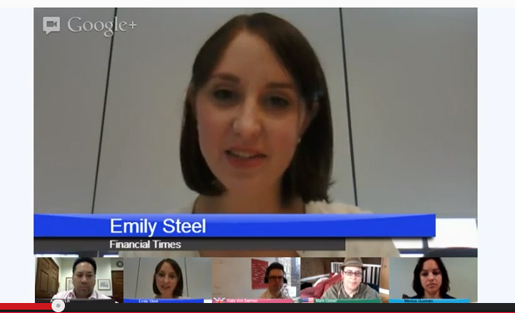There’s a lot of business to attend to on this week’s podcast. First, the business of microblogging grows up, with Twitter inking a massive ad deal with Starcom Mediavest Group worth “hundreds of millions of dollars,” according to FT’s Emily Steel. Steel broke the big story and will be joining us as a special guest; she is the media and marketing correspondent for the Financial Times and previously was a top reporter and social media editor at the Wall Street Journal. We’ll also look back at the Boston manhunt and how it changed the way we will follow breaking news in the future — for the good or bad? And the New York Times is in the business news for differing reasons: 1) a new plan to offer tiered pricing for tiers of content; and 2) a scathing Politico article about the tough leadership style of top editor Jill Abramson. We will obviously be taking care of business on this show.
You can watch or listen to today’s show below:
Subscribe to the MediaShift YouTube Channel here.
Subscribe to the audio podcast here
Listen to the Mediatwits and follow us on SoundCloud! Thanks to SoundCloud for providing audio support.
Subscribe to the Mediatwits audio version via iTunes
Follow @TheMediatwits on Twitter
Mediatwits Bios

Ana Marie Cox is a senior political columnist for The Guardian. She is the founding editor of the Wonkette blog and has covered politics and the culture of Washington, DC for outlets including the Washington Post, Playboy, GQ, Mother Jones and Elle. She is the author of the novel Dog Days and lives in St. Paul, Minn. Follower her on Twitter @anamariecox.

Mónica Guzmán is a columnist for the Seattle Times and Northwest tech news site GeekWire and a community strategist for startups and media. She emcees Ignite Seattle, a grab-bag community fueled speaker series. Mónica was a reporter at the Seattle Post-Intelligencer and seattlepi.com, its online-only successor, where she ran the experimental and award-winning Big Blog and drew a community of readers with online conversation and weekly meetups. Follow her on Twitter @moniguzman

Andrew Lih is a new media journalist, and associate professor at the University of Southern California’s Annenberg School of Communication and Journalism where he directs the new media program. He is the author of “The Wikipedia Revolution” (Hyperion 2009, Aurum UK 2009) and is a noted expert on online collaboration and journalism. He is a veteran of AT&T Bell Laboratories and in 1994 created the first online city guide for New York City (www.ny.com). Follow him on Twitter @fuzheado and buy his book here.

Felix Salmon is the financial blogger for Reuters. He was named one of Time Magazine’s 25 Best Financial Bloggers, and offers his frank view on the maneuverings of Wall Street, Washington and popular culture. Watch him on Felix TV or follow him on Twitter @felixsalmon.
Special Guest

Emily Steel is the U.S. media and marketing correspondent at the Financial Times, covering content and distribution companies, digital media innovators and the wider marketing industry. Previously, Steel was a reporter and social media editor at the Wall Street Journal, where she most recently served as a social media editor. Steel joined the WSJ in 2006, after graduating from the University of North Carolina at Chapel Hill with a degree in journalism and political science. At the Journal, she contributed several stories to the WSJ’s award-winning investigation about online privacy. She has also reported for the St. Petersburg Times and Shanghai Daily. Follow her on Twitter @emilysteel.
More Reading
1. An advertising deluge coming to Twitter?
At the moment, you probably don’t mind the ads you see on Twitter. But that might change. The microblogging service made a massive ad deal with Starcom Mediavest Group worth “hundreds of millions,” according to a story by our guest Emily Steel of the Financial Times. She found that the arrangement gives Starcom clients such as Walmart and Coca-Cola, access to preferred ad slots on Twitter, research and data and a possible “in-tweet mobile survey” to poll people in real-time. And the ads could work in concert with live TV viewing. What does this all mean? More ads coming to Twitter, and more revenues for Twitter before an expected IPO. Emily, tell us how you see this deal affecting Twitter’s future and our future use of the service.
Twitter reaches biggest ad deal yet (FT)
Twitter Strikes Ad Deal with Starcom MediaVest Group (Next Web)
Two Deals That Make It Obvious Where Twitter’s Heart Lies: Inside Your TV (paidContent)
Twitter and Starcom Sign Ad Deal (NY Times)
2. How the Boston manhunt changed breaking news
As our roundtable regular wrote in the Seattle Times, “we’re all journalists now.” And following the Boston bombings and the eventual manhunt online and on social media made everyone an amateur sleuth. Was this a good thing or bad thing? NPR’s Andy Carvin admitted the mistakes that he made, and said that the job of journalists is to help create an informed public — rather than informing the public. There’s no stopping people from doing their own journalism, so why not help them. And what about CNN? It made terrible mistakes during its coverage but got its highest ratings since the Iraq War. Will we ever follow breaking news the same way in the future?
One note: Our MediaShift poll asked: With breaking news, who do you trust most for accurate info? The leader by far was newspapers websites, with 38%, followed by “None of the Above” with 10%.
We’re All Journalists Now (Seattle Times)
ISOJ Keynote: Can Social Media Help Us Create a More Informed Public? (MediaShift)
It Wasn’t Sunil Tripathi: The Anatomy of a Misinformation Disaster (The Atlantic)
Boston Police Scanner Live-Tweeting Complicates Manhunt For Second Suspected Marathon Bomber (Huffington Post)
CNN Scores High Ratings in Boston Manhunt Coverage (NY Times)
3. NY Times pushes cheaper content; Jill Abramson criticized
NY Times CEO Mark Thompson came on board some months ago hoping to turn the ship around. He has a tough challenge, though, as print revenues decline and the only bright spot is increase in circulation revenues from the pay wall. His new strategy is to boost video content by making it free, offer lower cost access to “important stories” and higher cost access to more products like events. Will it work? The Times’ executive editor Jill Abramson was also in the spotlight for criticism that she was difficult to work for in a story by Dylan Byers at Politico. Others came to her defense saying the piece used anonymous sources and was sexist — or that the sources were sexist and couldn’t handle taking orders from a woman. Discuss.
The New York Times Announces New Strategy for Growth= (NY Times press release)
Times Company Reports a Drop in Income (NY Times)
New York Times Lifts Pay Wall for Video Plans, Franchises (paidContent)
Jill Abramson Loses the Newsroom (Politico)
Anonymous Sources Are Mad At New York Times Editor Jill Abramson For Trying To Be Their Boss And Stuff! (Huffington Post)
Poll
Be sure to vote in our weekly poll, this time about advertising on Twitter:
Mark Glaser is executive editor of MediaShift and Idea Lab. He also writes the bi-weekly OPA Intelligence Report email newsletter for the Online Publishers Association. He lives in San Francisco with his son Julian and fiancee Renee. You can follow him on Twitter @mediatwit. and Circle him on Google+


Don’t mind me…